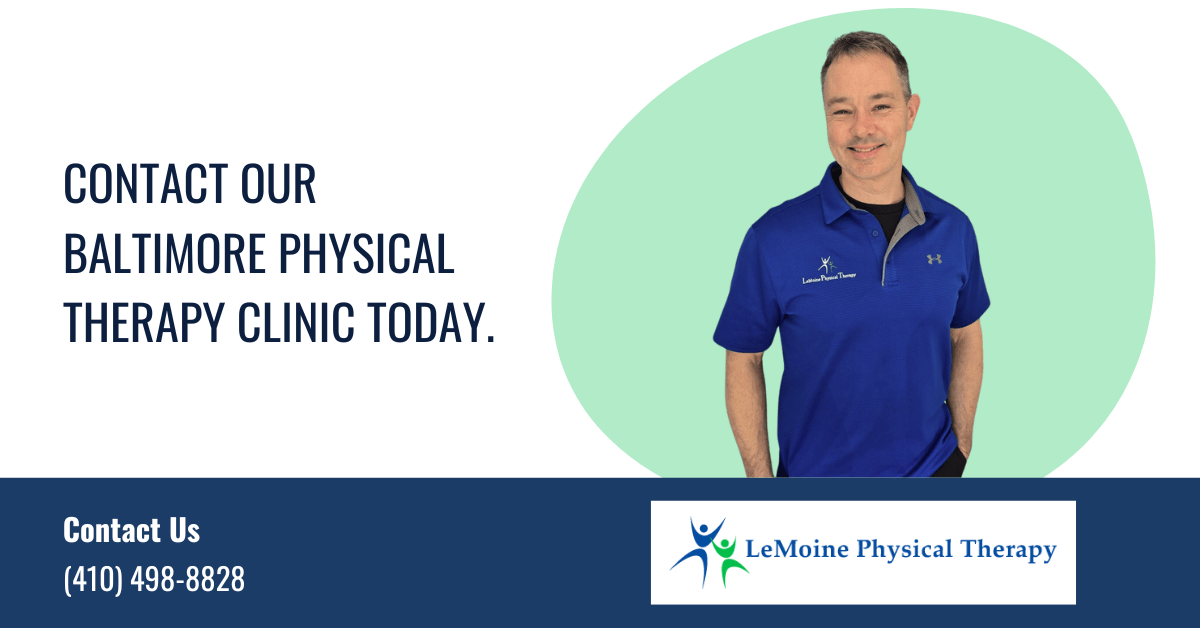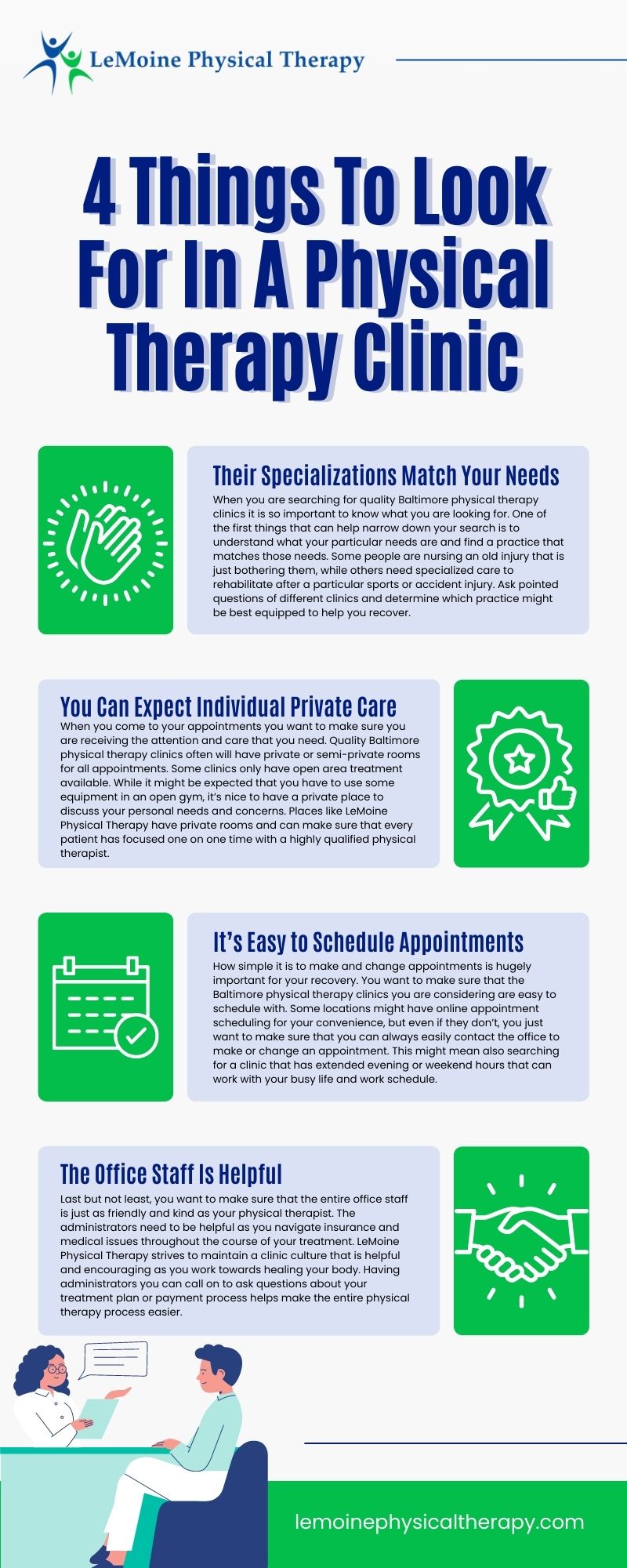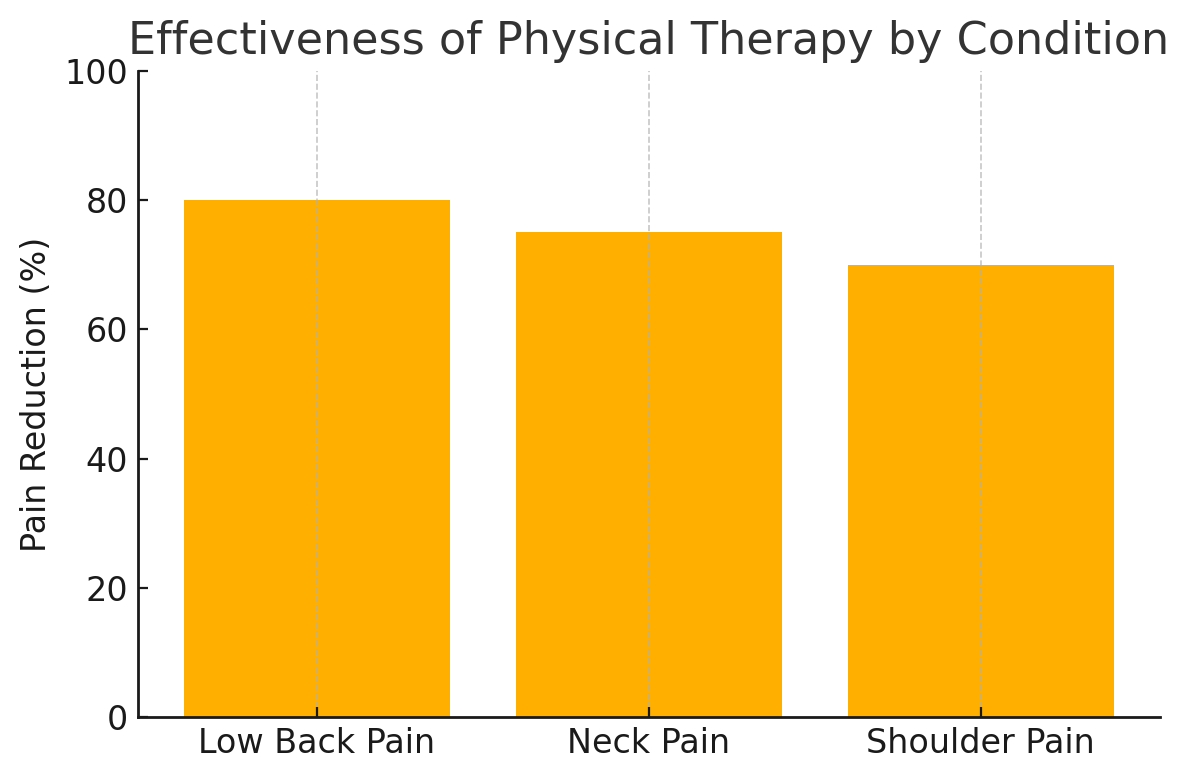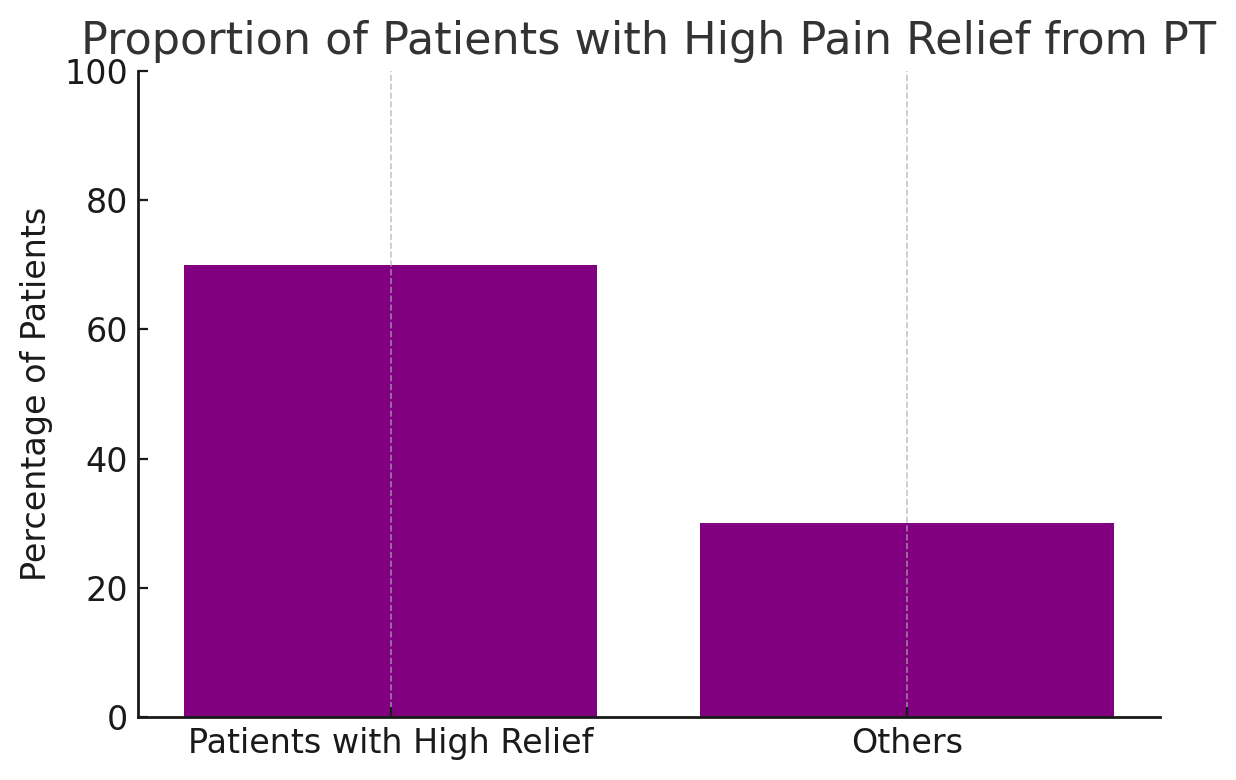Treating Pain With Physical Therapy
If you’ve recently sustained an injury, you may benefit from going to a physical therapy clinic Baltimore, MD residents trust. The non-invasive treatment can help alleviate your pain and help you restore physical function. If you’re suffering pain from an injury, make an appointment at our Baltimore physical therapy clinic, LeMoine Physical Therapy, today.
When you go to our clinic, you will receive treatment from a physical therapist who has received extensive training in how the body functions and moves. Our therapists understand that in order to live a happy, healthy life, patients need to be able to go about their daily lives in little to no pain. When conditions develop that cause long-term or chronic pain, the impact that pain can have on a patient’s quality of life can be significant.
Your physical therapist will work with you to not only help alleviate your pain, but to do so without the risk of additional injury, loss of movement, or the need to undergo invasive surgery. Reach out now to book an appointment.
Table of Contents
- Treating Pain With Physical Therapy
- Kinds of Conditions That Physical Therapy Treats
- Baltimore Physical Therapy Infographic
- Baltimore Physical Therapy Statistics
- Baltimore Physical Therapy FAQs
- Baltimore Physical Therapy Glossary
- LeMoine Physical Therapy, Baltimore Physical Therapy Clinic
- Contact Our Baltimore Physical Therapy Clinic Today
How To Get The Most Out Of Physical Therapy
- Dress Comfortably
During your physical therapy sessions, your therapist may have you perform several exercises. That’s why it’s critical to wear clothes that are easy to move around in, like yoga pants, t-shirts, gym shorts or tank tops. Avoid wearing jeans tight pants, as they can restrict your movements. Additionally, choose a pair of supportive shoes, like sneakers.
- Come Prepared
Before your first appointment at our physical therapy clinic in Baltimore, gather your medical records and list of medications you take. You should also be prepared to discuss your symptoms with your therapist. Is your pain sharp or dull? Does the pain increase when you do certain activities? The more information your therapist has to go on, the better he or she can help you.
- Take Notes
During your sessions, your therapist may throw a lot of information your way. To avoid forgetting something important your therapist tells you, take notes at your appointments. If you don’t understand something related to your diagnosis or treatment, don’t be afraid to ask your therapist for clarification.
- Commit To Your Appointments
The number of physical therapy sessions you require will depend on the severity of your injuries. Minor injuries may require just a couple sessions while more severe ones may require 10 or more sessions. It is important to attend all of your appointments to see maximum results. If you don’t see any improvement in your first couple of sessions, don’t feel discouraged. Some patients take longer to experience results than others.
- Listen To Your Physical Therapist’s Instructions
When it comes to physical therapy in Baltimore, MD, most patients are asked to complete exercises outside of their appointments. If your therapist assigns you exercises to do at home, you should do them. While they may be tedious at times, these exercises can help you recover faster.
- Be Honest With Your PT
It is important to always tell your physical therapist the truth. If you didn’t have time to do your exercises at home or your pain has gotten worse, let your therapist know. If your therapist doesn’t have all of the information, he or she can’t help you to the best of his or her ability.
What Happens During Your Initial Evaluation?
When you come to our Baltimore physical therapy clinic for the first time, we will ask you about your prior medical history, as well as the current issue that brings you to the clinic. It will also be important to treatment for the physical therapist to understand the patient’s level of pain and how that pain is affecting the patient’s ability to go about their daily life.
The therapist will then perform a physical evaluation of the patient. Some of the tests the patient may undergo include a muscle test, neurological screening, palpitations, posture assessment, range of motion test, and more.
Physical Therapy Treatments
There are a number of treatment options a physical therapist may incorporate into a patient’s treatment plan. This will all depend on the circumstances and the extent of the patient’s condition.
Therapists usually incorporate a variety of exercises in a treatment plan, both during appointments and at-home exercises. These can include active range of motion and active assistive range of motion exercise, isometric, isotonic, passive range of motion, and progressive restrictive.
A therapist may also use joint mobilization, heat therapy, cold therapy, muscle massage, ultrasound, and neuromuscular electrical stimulation for treatments.

Kinds Of Conditions That PTs Can Treat
Physical therapy can be beneficial for all sorts of situations. You might have a slight injury that has grown worse over time, be recuperating from surgery, need to strengthen an area of your body to reduce strain on a joint, or need therapy following a life altering event such as a stroke or heart attack. Unfortunately, even when you are young, waiting in hope that it might recover, isn’t the best solution. Your body can get better, but it might heal incorrectly and lead to larger issues down the road. Either way, you can seek care to get better at LeMoine Physical Therapy. We have experienced practitioners that want to work with you so you can get better as soon as possible. Call us today to set up an appointment. We have experience helping patients recover from many types of conditions including heart and lung conditions, neurological conditions, pregnancy conditions, sports-related injuries, and more.
- Heart And Lung Conditions
If you suffer from conditions such as chronic obstructive pulmonary disease (COPD), heart attack or heart failure, or cystic fibrosis, it may feel as if there is nothing you can do. But that simply isn’t the case. A physical therapist can help you improve your strength and optimize your movement so that you regain or retain your function and live a longer, more meaningful life.
- Neurological Conditions
These can take a wide range of forms such as stroke, traumatic brain injuries (TBI’s), Parkinson’s Disease, and spinal cord injuries. For a condition such as Parkinsons, your physical therapist will work with you to maintain your function and keep your strength for as long as possible. If, on the other hand, your body went through the trauma of a stroke or car crash, a physical therapist will help you regain your former ability to the greatest extent possible. If you have questions about your condition and what is possible for your unique circumstances, speaking with our experienced Maryland physical therapists can answer your questions.
- Pregnancy Conditions
Pregnancy causes your body to go through many changes both during and after you give birth. Going to a physical therapist before or during pregnancy can help you strengthen your pelvic floor, which can greatly improve your birthing processes and quicken your recovery after. Additionally, if you are having challenges following giving birth such as urinary incontinence, abdominal separation, or another condition, a physical therapist can help you strengthen the muscles around your pelvic floor so you can regain your strength.
- Sports-Related Injuries
This is perhaps what physical therapists are most commonly known for. If you’re an athlete suffering from an injury such as tennis elbow, runner’s knee, or a concussion, a physical therapist will work with you so you can recuperate and keep playing. Likewise, if you have torn your ACL, sprained an ankle, or dislocated your knee cap, you may be assigned physical therapy as part of your recovery. Expect your physical therapist to push you so that you get better quickly; however, if it feels like it is too much, then chat with them. We care about your mental health and will want what is best from you.
- Low Back Pain
More than 80% of all Americans will experience low back pain at some point in their lives. Low back pain can be treated by a physical therapist, who specializes in rehabilitating people with musculoskeletal injuries. The first thing a PT does is conduct an examination to determine the severity of the injury. If there are no major issues, then non-invasive methods such as heat packs and strengthening exercises may be all that’s needed to resolve the issue. More severe cases may require treatments such as spinal injections or bracing followed by physical therapy exercises to promote healing and prevent future injury.
- Hip Pain
Hip pain can be excruciating and can stop you from doing all the things you love. Your hip joint is made up of many ligaments, tendons, and muscles that create stability in your hip socket. If this area becomes tight or unstable, it will cause pressure on your hip muscles to work harder to compensate which eventually leads to more wear and tear. And with aging comes arthritis. Hip osteoarthritis means cartilage in the hip joint has been worn away resulting in a condition where too much friction can take place during movement causing pain and stiffness in your joints as well as making moving difficult.
- Shoulder Pain
Shoulder pain can be caused by several different things, from injury to disease. One of the most common causes is an overuse injury that arises when the shoulder muscles are overworked for an extended period of time and lose their ability to properly support the joint. Our Baltimore physical therapy clinic will take into account your symptoms and conduct an examination in order to diagnose your condition. Treatments include applying ice, taking anti-inflammatory medication, using muscle relaxants or injections if necessary. Treatment will typically be gradual with periods of rest and recuperation throughout so that it doesn’t aggravate the condition further.
- Numbness And Tingling In The Extremities
When you experience numbness and tingling in the extremities, it can be an indicator of diabetes, or even something more serious. The best way to diagnose this symptom is with a physical exam. Some other common ailments that cause these symptoms are peripheral neuropathy, low blood sugar, shingles or nerve damage from trauma. If the cause is not identified by a thorough examination, your physician may recommend that you see a neurologist.
Physical therapy can also help to improve blood flow to nerves and reduce swelling due to injury or inflammation. Numbness may also result from arthritis in joints, like those in your neck which affect sensations going down your arm.
- Balance And Dizziness
Physical therapy may help with balance and dizziness. Physical therapists typically have an education in physiology and can assess the body from head to toe. They are also specially trained to administer rehabilitation exercises as well as provide physical therapy treatments such as joint mobilization, soft tissue massage, electrotherapy modalities (such as ultrasound), therapeutic exercises and more. For example, if you are recovering from a stroke or traumatic brain injury, your therapist will focus on improving your posture and arm function so that you are able to live independently again.
Baltimore Physical Therapy Infographic

Baltimore Physical Therapy Statistics
According to a study published in the Journal of Physical Therapy Science, researchers found that physical therapy was effective at reducing pain in people with a variety of conditions, including low back pain, neck pain, and shoulder pain, in some people up to 80 percent.


Baltimore Physical Therapy FAQs
What Can A Physical Therapist Do for Me?
If you’ve been injured – or if you’re just fed up with nagging pain – contacting our qualified Baltimore physical therapists is the first step to getting your life back on track. Whether you’re suffering from sports-related pain or you were recently in a bad car accident, you may have to contact a physical therapist who can get you moving again.
Many people have heard of physical therapy, or have been referred to physical therapists without fully understanding what to expect. It’s important to know what you’re getting into before you fully commit to any sort of treatment or recovery plan.
What Does Physical Therapy Help With?
Physical therapy covers many different bases. No two cases are alike, but each client has a reason for seeking physical therapy services. The reasons are many and varied: athletic injuries, post-operative recovery, chronic or nagging pain – the list goes on, and a physical therapist can help with all of these and more.
It’s important to remember that physical therapy is not a “silver bullet”. Physical therapists provide a workable recovery plan so you can regain a degree of mobility after injuries, or so you can finally lessen pain that’s been bothering you for a long time. It’s not a magical practice, nor is it a cure-all. It takes lots of work and commitment from both you and your physical therapist, and it’s important to keep your expectations realistic.
What Will My Treatment Entail?
Treatment depends on the case. The right physical therapist will work with you to create a recovery plan that works for your time frame and your injuries, and by working together, you and your physical therapist can get you back to 100% – or as close to 100% as possible. Your physical therapist will keep close track of your progress between meetings, and may also create tailored exercises that you can do to help your recovery along.
When helping you develop a recovery plan, your physical therapist may ask you a number of questions, primarily your goals for your recovery and the source of your pain. Your medical history gives your physical therapist a better idea of what your recovery plan should look like, and the exercises you’ll have to perform.

Baltimore Physical Therapy Glossary
At LeMoine Physical Therapy, you’ll hear us use various medical terms, phrases, and jargon when describing or communicating about your treatment. Understanding these terms is essential to navigating the healthcare environment and ensuring patients receive optimal care. Below are five important terms, along with their definitions.
Informed Consent
Informed consent is a legal and ethical process that ensures patients understand the treatment they will receive before physical therapy procedures begin. It involves providing clear, comprehensive information about the treatment plan, expected outcomes, potential risks, and any alternative options available. By signing the informed consent document, the patient acknowledges their understanding and voluntarily agrees to proceed. This process protects both the patient’s rights and our Baltimore physical therapy clinic’s legal standing, ensuring the patient is well-informed and consents to their care.
Range Of Motion Test
A range of motion (ROM) test is a standard evaluation tool in physical therapy used to assess the movement capacity of a joint or group of muscles. During this test, the physical therapist will ask the patient to perform specific movements while they measure the angle or distance the joint or muscle can move without discomfort. It helps determine the extent of any injury, inflammation, or muscle weakness. ROM tests can also track the patient’s progress as therapy continues, ensuring the treatment is effective in restoring mobility.
Neurological Screening
Since 2007, our Baltimore physical therapy clinic has used neurological screening. Neurological screening is a series of tests to evaluate the health and function of the nervous system. This includes assessing reflexes, coordination, muscle strength, sensation, and balance. It’s essential for identifying underlying neurological conditions, such as nerve compression, spinal cord injuries, or neurological disorders that could impair a patient’s physical function. Through neurological screening, physical therapists can pinpoint areas of concern and develop a targeted rehabilitation plan to address specific neurological impairments.
Muscle Palpation
Muscle palpation is the technique by which a physical therapist uses their hands to examine the muscles, tendons, and soft tissues of the body to identify abnormalities such as tightness, soreness, or inflammation. This hands-on method helps the therapist assess the degree of muscle tension or injury and determine the best course of treatment, such as stretching or strengthening exercises. Palpation is often used alongside other assessment methods to get a comprehensive understanding of the patient’s condition and tailor the therapy to their needs.
Progressive Restrictive Exercise
Progressive restrictive exercise refers to a treatment approach in which exercises are gradually made more challenging to enhance strength, endurance, and overall function. In physical therapy, this approach helps patients regain mobility and improve their physical capabilities after injury or surgery. The exercises start with easier, less demanding movements, and as the patient’s strength and mobility improve, the difficulty level increases. This progressive method helps ensure that the rehabilitation process is effective while minimizing the risk of injury or strain.
LeMoine Physical Therapy, Baltimore Physical Therapy Clinic
6615 Reisterstown Rd Suite 300, Baltimore, MD 21215
Contact Our Baltimore Physical Therapy Clinic Today
If you are having issues with pain, limited mobility, or other condition and are considering treatment from a Baltimore physical therapy clinic, contact LeMoine Physical Therapy to schedule a consultation and find out what treatment options may be available for your situation.

